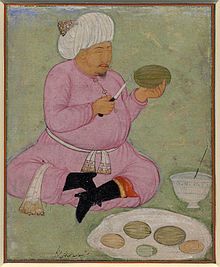Abdullah Khan II
| Abdullah Khan II | |||||
|---|---|---|---|---|---|
| Abdulla Khan | |||||

Abdullah Khan Uzbek II slicing melons
|
|||||
| Reign | 1583 - 1598 | ||||
| Coronation | 1583 | ||||
| Predecessor | Iskander bin Jani Beg | ||||
| Successor | Abdul-Mo'min bin Abdullah Khan | ||||
| Born | 1533 | ||||
| Died | 1598 | ||||
|
|||||
| Uzbeq | عبد اللہ خان بن اسکندر | ||||
| House | Shaybanid | ||||
| Dynasty | Shaybanid Dynasty, Khanate of Bukhara | ||||
| Religion | Islam | ||||
| Full name | |
|---|---|
| Abdullah Khan bin Iskander |
Abdullah Khan (Abdollah Khan Ozbeg) (1533/4–1598), known as "The old Khan", was an Uzbek/Turkoman ruler of the Khanate of Bukhara (1500–1785). He was the last Shaybanid Dynasty Khan of Bukhara, from 1583 until his death.
Abdullah Khan initiated a war with Persia which lasted from 1587 to 1598. He was able to focus on this thanks to a non-aggression pact with the Mughal emperor, Akbar, through which Abdullah Khan recognized Akbar's right to rule in the territory of Kabul.
During the reign of Abdullah Khan, Abdul Karim Khan was the ruler of Kashgaria, to the east in present-day Xinjiang. However, diplomatic relations were not good between the two khans.
Abdullah Khan was born in 1533 or 1534, in the town of Afarinkent, Samarkand Province.
After the death of Abdulaziz Shaybanid was a struggle for the throne. Khan Abdullatif, who ruled the Samarkand, sought to ruler Bukhara through his two grandchildren: Shaibani Khan Yar Muhammad Sultan and Burhan-Sultan.
However, after the death of Abdullatif Khan in 1551, Barak Khan, who ruled Tashkent, took Samarkand and established himself as ruler there under the name of Newroz Ahmed Khan. He was declared the supreme khan of the Uzbeks. Shaybanidov Abdullah Sultan, who was then governor of Kermine, led the resistance against Newroz Ahmed Khan. He was assisted by his uncle, the governor of Balkh, Pirmuhammed Khan. In 1556 Newroz Ahmad died. With his death, Pirmuhammed Khan was proclaimed the supreme ruler of the Uzbeks.
In 1557, Abdullah Sultan captured Bukhara with the support of Sufi sheikhs and became its ruler. In 1561, he was bold enough to proclaim his father Iskander as supreme khan of the Uzbeks. He had previously ruled Kermine and Miankal. Abdullah's father was more interested in religious rites, so he entrusted the conduct of state affairs to his son Abdullah Sultan.
...
Wikipedia
